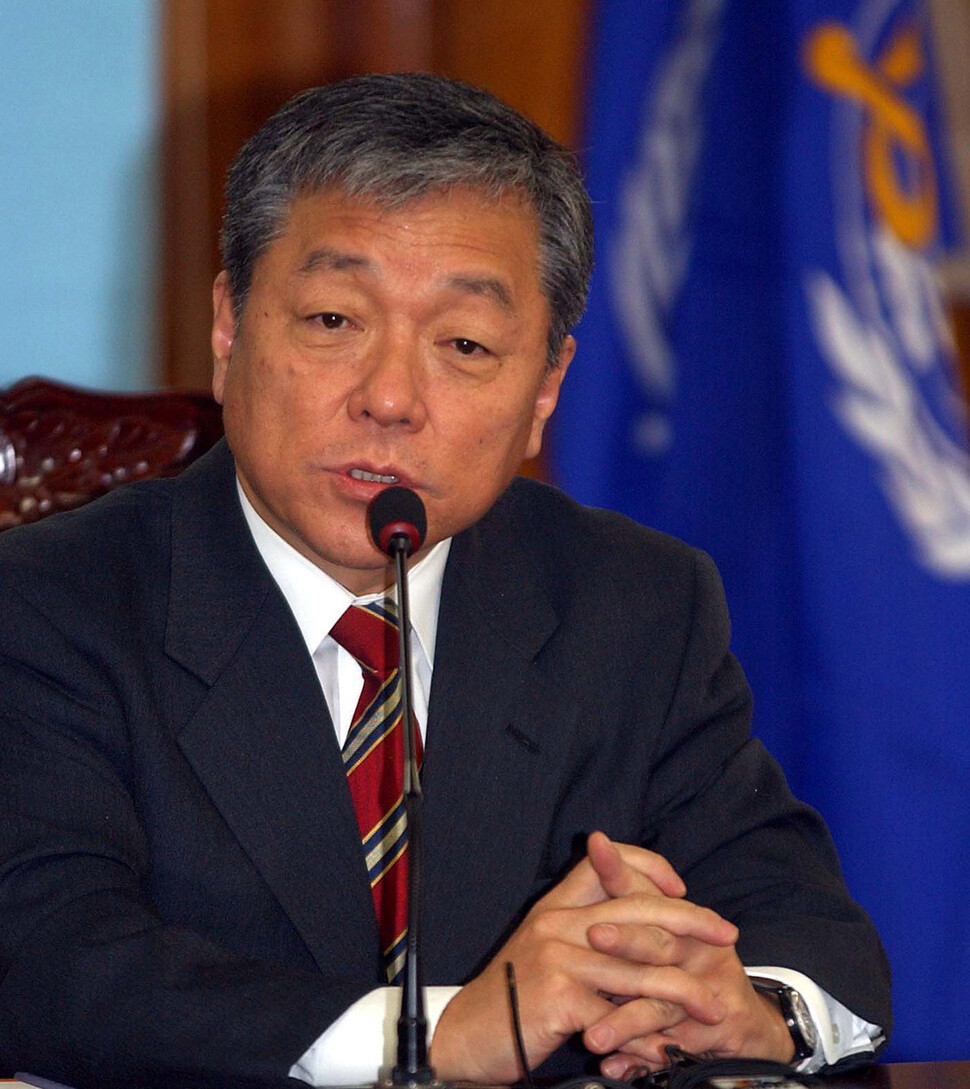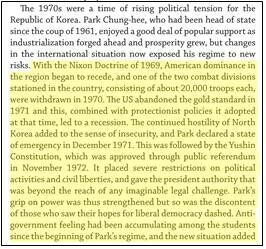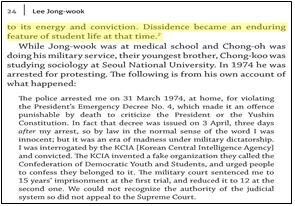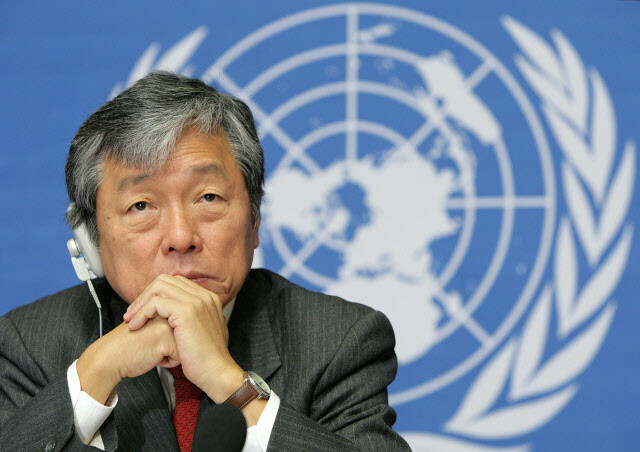hankyoreh
Links to other country sites 다른 나라 사이트 링크
Lee and Park administrations censored biography of former WHO director-general

The Lee Myung-bak and Park Geun-hye administrations excised a passage referring to former President Park Chung-hee’s Yushin (“reformation”) dictatorship (1963-1979) from a biography of late former World Health Organization (WHO) Director-General Lee Jong-wook.
“The Korean translation of ‘Lee Jong-wook: A Life in Health and Politics’ omits a passage about the Yushin dictatorship that is in the original English version,” Democratic Party lawmaker Shin Dong-keun told the Hankyoreh on Oct. 21.

While the original English text published in June 2012 includes an account of the Yushin dictatorship, the Korean translation published during the Park Geun-hye administration in Nov. 2013 was missing the eight sentences in question. Included in the missing portion was a passage describing the Yushin Constitution as having “placed severe restrictions on political activities and civil liberties, and [given] the president authority that was beyond the reach of any imaginable legal challenge.”
“Antigovernment feeling had been accumulating among the students since the beginning of [Park Chung-hee’s] regime,” the passage continued, adding that “dissidence became an enduring featuring of student life at that time.”
The biography “Lee Jong-wook” was written by British author Desmond Avery, who also penned speeches for Lee while he was serving as WHO director-general. The biography’s publication was pursued under an agreement with the WHO as part of an effort to commemorate Lee by the Korea Foundation for International Healthcare (KOFIH), a government-funded organization under the Ministry of Health and Welfare (MOHW).

Deletion discussed at meeting of KOFIH and MOHW officials
The deletion of the sentences mentioning the Yushin dictatorship was discussed at a meeting on the Korean version’s publication by KOFIH officials and an official from MOHW’s international cooperation office on Mar. 16, 2012, during the Lee Myung-bak administration. The meeting’s results were summarized in a document from Apr. 2 of that year titled “Results of the Advisory Meeting on the Korean Publication of the Lee Jong-wook Biography.”
“As the content related to the political and societal situation in the 1970s is not significantly related to the late Dr. Lee Jong-wook or absolutely necessary for this biography, it would be better to delete or supplement it,” the document said, adding that “email requesting the deletion of the corresponding (three) portions was sent to a WHO official on Mar. 16, 2012.”
The three portions referred to were listed as “① (English version) portion concerning the Park Chung-hee administration in the 1970s on p. 23, ② description of the Philippine dictatorship on p. 80, and ③ part about response measures to an employee strike during [Lee’s] time as director-general on p. 181.” Of the three portions referenced, only the first one concerning the Park Chung-hee administration was actually removed.
An additional report titled “Examination Meeting for Korean Translation of Lee Jong-wook Biography” listed the results of a meeting by a MOHW bureau director and deputy director and KOFIH officials during the Park Geun-hye administration on Aug. 7, 2013.
In it, a representative of Lee Jong-wook’s family is listed as having recommended “softening the wording of the political content,” with a foundation official promising to “consult with the publishers to present the content concerning the system in the 1970s in more value-neutral terms.” The portion concerning the Yushin dictatorship was ultimately cut in its entirety.
MOHW and KOFIH officials also made political judgments when ruling out publishers. The 2012 advisory meeting document states that of the four companies the foundation had sent publication requests for the Korean translation in 2011, only publisher Silcheon Munhak ultimately accepted. But MOHW and KOFIH officials concluded that Silcheon would be “unsuitable for the foundation as a public institution due to its political leanings.” “Lee Jong-wook” was finally published by the publishing firm Namu-wa Sup, which was not one of the four initially sent requests.
“The conservative administrations of Lee Myung-bak and Park Geun-hye even applied political standards in judging the life of Lee Jong-wook, a global figure who has been called the ‘Asian Albert Schweitzer,’” said Shin Dong-keun.
“The Korean translation should be republished now with the passage about the Yushin dictatorship restored to its original text,” Shin urged.

By Kim Kyu-nam, staff reporter
Please direct comments or questions to [english@hani.co.kr]

Editorial・opinion
![[Column] Park Geun-hye déjà vu in Yoon Suk-yeol [Column] Park Geun-hye déjà vu in Yoon Suk-yeol](https://flexible.img.hani.co.kr/flexible/normal/500/300/imgdb/original/2024/0424/651713945113788.jpg) [Column] Park Geun-hye déjà vu in Yoon Suk-yeol
[Column] Park Geun-hye déjà vu in Yoon Suk-yeol![[Editorial] New weight of N. Korea’s nuclear threats makes dialogue all the more urgent [Editorial] New weight of N. Korea’s nuclear threats makes dialogue all the more urgent](https://flexible.img.hani.co.kr/flexible/normal/500/300/imgdb/original/2024/0424/7317139454662664.jpg) [Editorial] New weight of N. Korea’s nuclear threats makes dialogue all the more urgent
[Editorial] New weight of N. Korea’s nuclear threats makes dialogue all the more urgent- [Guest essay] The real reason Korea’s new right wants to dub Rhee a founding father
- [Column] ‘Choson’: Is it time we start referring to N. Korea in its own terms?
- [Editorial] Japan’s rewriting of history with Korea has gone too far
- [Column] The president’s questionable capacity for dialogue
- [Column] Are chaebol firms just pizza pies for families to divvy up as they please?
- [Column] Has Korea, too, crossed the Rubicon on China?
- [Correspondent’s column] In Japan’s alliance with US, echoes of its past alliances with UK
- [Editorial] Does Yoon think the Korean public is wrong?
Most viewed articles
- 1‘We must say no’: Seoul defense chief on Korean, USFK involvement in hypothetical Taiwan crisis
- 2N. Korean delegation’s trip to Iran shows how Pyongyang is leveraging ties with Moscow
- 3[Column] Park Geun-hye déjà vu in Yoon Suk-yeol
- 4Amnesty notes ‘erosion’ of freedom of expression in Korea in annual human rights report
- 5‘Weddingflation’ breaks the bank for Korean couples-to-be
- 646% of cases of violence against women in Korea perpetrated by intimate partner, study finds
- 7[Reportage] On US campuses, student risk arrest as they call for divestment from Israel
- 8“Parental care contracts” increasingly common in South Korea
- 9[Interview] Dear Korean men, It’s OK to admit you’re not always strong
- 10Korean government’s compromise plan for medical reform swiftly rejected by doctors